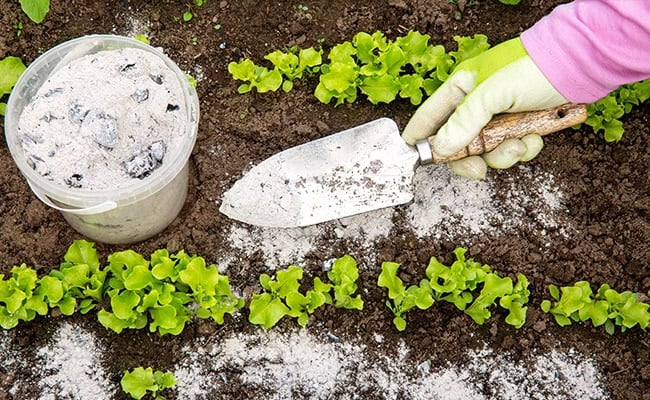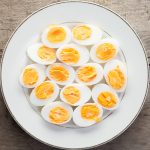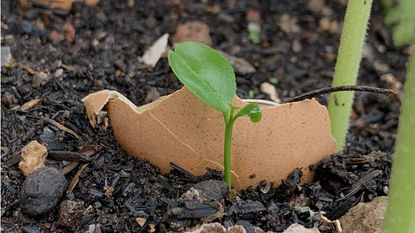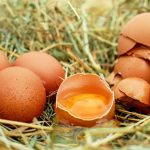Egg is a source of nutrients for both humans and plants. I am saying this because it has 96% calcium carbonate (CaCO3) with some consent of phosphorus (0.3%), magnesium (0.3%), and a small amount of sodium, potassium, zinc, manganese, iron, and copper
With these macros and micronutrients plants can easily be grown to their natural habitat.
So, if you want to use old eggs in your garden, then crush them, and scatter the shells around your plants for added nutrients and protection against pests.
Eggs have multiple benefits for garden soil and plants. Some of the important aspects are-
- Crush and Scatter as Fertilizer
- Make Eggshell Seed Starters
- Create Pest Deterrents
- Enhance Compost Piles
- Boost Soil Calcium Levels
- Feed the Birds.
- Improve Tomato Plant Health
- Aid Plant Growth
- Natural Garden Decor
- Fertilize Houseplants
- Inhibit Blossom End Root.
Besides being a rich source of calcium, they also provide a boost of protein and other essential nutrients. By crushing the eggshells and sprinkling them around your garden, you not only enrich the soil but also deter pests like slugs and snails.
However, the sharp edges of the shells act as a physical barrier, keeping these unwanted guests away from your plants.
Additionally, eggshells decompose slowly, providing a long-lasting source of nutrients for your plants.

Credit: sunnydazedecor.com
Advantages of Burying Aged Eggs into Your Garden
Old eggs can provide essential nutrients for your vegetables, resulting in healthier growth and increased yields. Here are the benefits of it-
Natural Source Of Nutrients For Plants
Eggs, particularly old eggs, offer a natural and nutrient-rich boost to your garden. It provides vitamins and minerals and so many things that nourish your plants with increasing growth and fruiting.
Here’s why using old eggs in the garden is beneficial:
Calcium: Crushed eggshells are an excellent source of calcium 96%, which is vital for plant growth and development. The calcium in eggshells can help prevent conditions such as blossom end rot in tomatoes and peppers.
Protein: Egg whites contain protein, which is an essential nutrient for plants. When eggs break down in the soil, they release this protein, providing a valuable source of nourishment for your garden plants.
Trace minerals: Old eggs contain trace minerals like magnesium, sulfur, and potassium, which are essential for healthy plant growth. These minerals contribute to processes such as photosynthesis and enzyme activation, ensuring your plants thrive.
Improves Soil Quality And Fertility
In addition to being a natural source of nutrients, using old eggs in the garden can improve the overall quality and fertility of the soil. Here’s how:
Enhanced drainage:
When eggshells are crushed and added to the soil, they create air pockets, leading to improved drainage. This can prevent waterlogging and ensure plants receive adequate oxygen and nutrients.
Balanced pH levels:
Eggshells are alkaline in nature by 8 to 9., making them ideal for neutralizing acidic soils.
Organic matter:
As eggs decompose, they contribute to the organic matter content of the soil. This organic matter adds nutrients, enhances soil structure, and promotes microbial activity, all of which are vital for healthy plant growth.
Thus it decreases the use of synthetic fertilizer which gives you safe foods.
Also Read: How to Use 13-13-13 Fertilizer For Vegetable Garden?

What If You Want to Ensure Eggs Are Safe to Use in the Garden?
If you’re not sure if the eggs are infested with bacteria or something like that, then some procedure will help you to solve this problem.
You can do it by taking a few options like-
Egg freshness and quality:
You should perform first the float test to determine if an egg is still fresh.
Place the egg in a bowl of water, and if it sinks to the bottom horizontally, it is fresh. If it partially floats or stands vertically, it is not suitable for garden use. But using shells is okay for garden use.
Check for unwanted odors. If an egg emits a strong or unpleasant smell, it is no longer fresh and should not be directly used in the garden.
Pasteurizing eggs:
If you have concerns about potential pathogens in the eggs, consider pasteurizing them before using them in the garden.
Pasteurization involves immersing the eggs in hot water (approximately 140°F or 60°C) for about 4-5 minutes to kill any harmful bacteria present.
After pasteurization, let the eggs cool down before utilizing them in the garden.
Avoiding cross-contamination:
Always handle eggs with clean hands and avoid contact with other garden produce or surfaces that might transfer potential contaminants.
Wash hands thoroughly after handling eggs to minimize the risk of foodborne illnesses
10 Best Ways To Use Old Eggs in The Garden.
You can use these methods to replenish your garden. But take consideration of your garden environments. Here is the list of them-
1) Crush and Scatter as Fertilizer
As a natural fertilizer crushed eggshells will be a fantastic addition to your garden. They are a rich source of calcium, which is essential for plant growth and development. Some other natural fertilizing options you can add to it with-
- Coffee grounds,
- Banana peels,
- Chicken eggshells,
- Duck eggshells,
- Greensand,
- Limestone,
- Rock phosphates.
You can utilize eggshells as fertilizer, simply crush them into small pieces ( 2-3 mm ) and scatter them around your garden soil.
As the eggshells break down, they release calcium into the soil, providing a steady and slow-release (about a year)source of this vital nutrient to your plants.
This is particularly beneficial for plants like tomatoes, peppers, and eggplants that are susceptible to calcium deficiency, which can lead to problems like blossom end rot.
Here is a brief of calcium deficiency in vegetable plants:
| Issue | Symptoms |
| Tissue necrosis | Premature death of cells, black, soft, liquidy tissue lesions |
| Stunting | Stunted plant growth |
| Leaf curling | New leaves curl at the edges |
| Brown spots | Yellow or brown spots on leaf edges |
| Browning | Browning and dieback of growing tips of roots and leaves |
| Misshapen leaves | Youngest leaves are usually small and misshapen |
| Gummy exudate | Gummy exudate from the leaves |
2) Make Eggshell Seed Starters:
You can use eggshells to help your seeds grow into strong plants.
First, crack the top part of an eggshell and keep the bottom part. Put some soil mix inside the eggshell and plant your seeds in it.
Some tiny vegetable seeds are suitable to grow on-
- Tomatoes
- Peppers (bell peppers, chili peppers, etc.)
- Cucumbers
- Zucchini
- Squash
- Eggplant
- Okra
As your seeds grow into little plants, the eggshell will protect and feed them. When it’s time to move your plants to the garden, you can put the whole eggshell in the soil.
The eggshell will break down slowly, giving your plants extra calcium and helping their roots get strong. It’s a great way to help your garden grow.

3) Create Pest Deterrents:
Eggshells are like little protectors for your garden because they can help keep away pesky pests like slugs and snails.
These critters don’t like sharp or rough surfaces, and when you crush eggshells into tiny pieces and put them around your plants, it creates a kind of prickly barrier.
Imagine if you had to walk on a path of pointy rocks – you’d probably choose another way, right? Well, that’s what happens to these garden pests when they encounter crushed eggshells.
They find it uncomfortable and prefer not to cross it, which means your plants stay safe from their nibbling.
The best part is that you don’t need to use any harmful chemicals; it’s an eco-friendly and smart way to protect your garden naturally.

Read: How to Get Rid of Ants in Garden Without Killing Plants? ( 14 Categorized Method)
4) Enhance Compost Piles:
Compost is like plant food, and it needs to be just right. Eggshells add something called calcium, which is like a magic ingredient for compost.
It helps keep the compost from being too sour or acidic.
Plus, calcium helps break down stuff in the compost, making it all turn into great plant food.
Using eggshells in your compost is easy. Just crush them into tiny pieces, like you’re making magic dust, and then sprinkle them in your compost pile.
The tiny pieces of eggshells break down, and that’s a good thing because it helps make your compost full of nutrients.
When your compost is all grown up and ready, you can use it to make your garden soil happy and healthy.

5) Feed the Birds:
Eggshells are not just helpful for your garden; they can also be a wonderful treat for the birds in your neighborhood.
Birds love eggshells, and they are actually recommended as a food source for bird feeders. These calcium-rich eggshells are particularly beneficial for female birds, especially during their nesting season when they need extra calcium for eggshell formation.
Many wild birds enjoy feasting on crushed eggshells, making them a favorite among several species, including Orioles, Tanagers, Warblers, Thrushes, Crows, Jays, Blackbirds, and Swallows.
In fact, a study conducted by the Cornell Lab of Ornithology discovered that approximately 60 different bird species relish eggshells for the essential grit and calcium they provide.
So, if you have bird feeders in your garden, consider including crushed eggshells in their offerings.
It’s a fantastic way to support local bird populations, provide them with necessary nutrients, and enjoy the delightful presence of these feathered friends in your outdoor space.

6) Improve Tomato Plant Health
Tomato is a widely grown vegetable for every garden. And the important part is eggshells can work wonders for tomato plants by providing them with calcium, potassium, and magnesium, which is like a superfood for these veggies.
When tomato plants get enough calcium from eggshells, they become strong and can produce more buds, which means more tomatoes for you to enjoy.
Also, calcium helps protect tomato plants from a not-so-friendly condition called blossom end rot, which can make your tomatoes sad.
There are a few ways you can use eggshells to make your tomato plants extra happy.
- You can dry the eggshells, crush them into tiny bits, and mix them into the soil where your tomatoes are growing.
- Another option is to compost the eggshells and add the rich, crumbly compost to your tomato plants.
- You can even sprinkle crushed eggshells into each hole before planting your tomato seedlings or place them around the main stem of your plants.
7) Natural Garden Decor:
In addition to their practical uses in the garden, eggshells can also serve as charming and eco-friendly garden decor.
You should repurpose eggshells by painting or decorating them and using them as decorative elements in your garden.
These decorated eggshells can add a whimsical touch to your outdoor space, especially when used as plant markers, hanging ornaments, or table centerpieces for garden gatherings.
The natural and biodegradable nature of eggshells makes them a sustainable and creative choice for garden decor, allowing you to infuse your garden with personal style.

8) Fertilize Houseplants:
Eggshells can benefit indoor plants as well. Houseplants can occasionally suffer from calcium deficiency, which can lead to issues like weak stems and poor growth.
Crushed eggshells can provide a natural calcium supplement for houseplants.
You can use and fertilize houseplants this way-
Powder
- Grind clean eggshells into a fine powder using a food processor, coffee grinder, or mortar and pestle.
- Mix the powder with the soil when you repot your plant or spread it onto the soil around the base of the plant.
Water
- Crumble eggshells into a pot, cover with water, and boil.
- Let the mixture cool overnight so the eggshell goodness leaches into the water.
- Strain to remove the shells. Water indoor plants as you normally would, giving special attention to nutrient-starved favorites.
Read More: How Often To Water Raised Bed Garden? ( Experimental Results )
Fertilizer tea
Add your ground eggshells to a jar of boiled water and let sit for 24 hours. Then use to water your plants.
What Plants Benefit Most From Egg Yolk Fertilization?
Egg yolk fertilizer can benefit a variety of plants, especially those that require additional nutrients. Consider using egg yolk fertilizer for:
- Leafy greens: Plants like lettuce, spinach, and kale thrive with the extra nutrients from egg yolks.
- Fruit-bearing plants: Boost the growth and yield of fruits such as strawberries, blueberries, and raspberries with egg yolk fertilization.
- Houseplants: Indoor plants can also benefit from the extra nutrients in egg yolks.
Now that you know how to incorporate old eggs into your garden routine, you can make the most of your egg surplus while improving the health and productivity of your plants.
Is It Okay to Use Raw Eggs in Your Garden?
Absolutely, you can use raw eggs in your garden, and they can be quite beneficial.
Eggs are packed with protein and nitrogen, which are like superfoods for your plants. They not only promote plant growth and make them stronger but also help break down organic matter in the soil, turning it into valuable nutrients.
There are several ways to incorporate raw eggs into your garden routine. You can bury a whole raw egg in the soil alongside your plant, making sure to cover it with soil.
Another method is to place a raw egg at the bottom of each pot before adding your plants. If you’re planting tomatoes, you can dig a hole and plant the eggshells deeply before placing your tomato plant in the ground.
Over time, the eggs will gradually decompose beneath the soil, acting as a natural fertilizer. However, it’s important to note that while the egg’s insides break down and benefit your plants, the eggshell itself typically doesn’t fully decompose.
Instead, it tends to break into small pieces, which don’t provide any direct benefits to your plants.
As a bonus, eggs can also serve as a deterrent for deer.
These animals are not fans of the smell of eggs, so placing them strategically around your garden can help keep deer at bay, protecting your precious plants.
Frequently Asked Questions
Can You Bury Old Eggs In The Garden?
Absolutely. Burying old eggs in your garden is a smart way to recycle and nourish your plants. Eggs are packed with calcium, a vital nutrient for plants, especially those that produce fruits and veggies.
You can create compost holes and bury not only old eggs but also other organic matter like fish bones and animal parts.
Alternatively, crush eggshells into fine grains and mix them into your garden soil to provide a slow-release source of calcium.
However, it’s best not to bury raw eggs directly, as their smell may attract unwanted pests.
How Do You Use Rotten Eggs In The Garden?
Rotten eggs can still be valuable in your garden. Break them into small pieces, mix them with soil, and let the mixture sit for a few days.
This creates a nutrient-rich blend that can be added to your garden. If you have cracked or rotten eggs, consider burying them under plants to help deter pests.
But remember to bury them deep enough to avoid attracting rodents.
Additionally, you can turn rotten eggs into a deer repellent by blending three eggs with a gallon of water and spraying it on your plants..
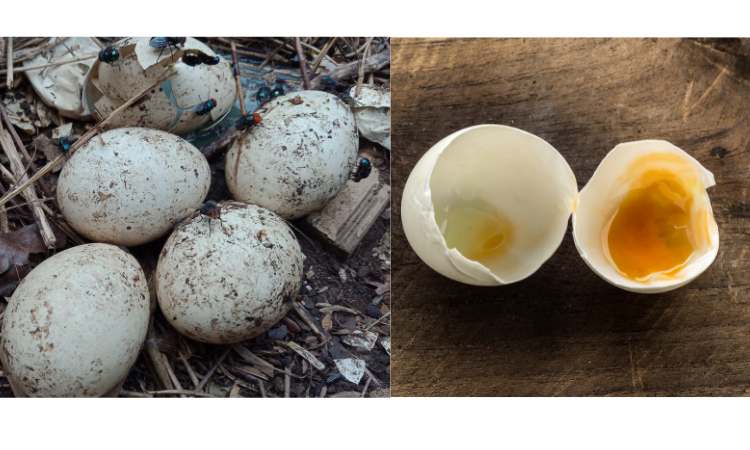
What To Do If Eggs Are Old?
If you find that your eggs are old, you don’t need to toss them out immediately. First, perform the float test to check their freshness.
Fill a bowl with water and gently place the eggs in it. Fresh eggs will sink to the bottom and lay flat on their sides.
If they stand upright on the bottom but still touch it, they are a bit older but still good to use. If they float to the top, it’s best to discard them.
Old eggs can still serve a purpose in your garden.
You can crush them into small pieces and mix them with soil or compost them, where they will naturally break down over time and enrich your compost with calcium and other nutrients.
So, don’t waste those old eggs; put them to work in your garden.
Conclusion
In conclusion, old eggs have more to offer than we might think. They can be buried in our gardens to naturally enrich the soil and provide essential nutrients like calcium to our plants. Whether it’s through composting, creating natural fertilizers, or using them as a deer repellent, old eggs find new life in our gardens.
So, the next time you come across some aging eggs in your kitchen, consider giving them a second chance in your garden, where they can play a vital role in nurturing your plants and promoting a healthier, more vibrant outdoor space.
It’s a sustainable way to reduce waste and boost your garden’s health at the same time.

I am a graduate of Bangladesh Agricultural University, where I delved into various agricultural disciplines, equipping me with a profound understanding of agriculture. Beyond academics, I have hands-on experience in gardening and crop cultivation. My passion is to embrace sustainable farming and horticulture. With a BSc in Agriculture, I am dedicated to promoting environmentally conscious and efficient agrarian practices.
Bachelor of Science (BSc) in Agriculture (Hons.)
Master of Science. (Sustainable Agriculture & Food Security ) (MS)
Bangladesh Agricultural University
